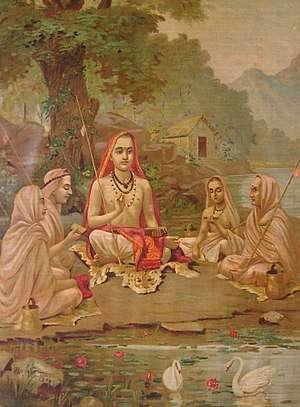Bhaja Govindam
Bhaja Govindam (Praise/Seek Govinda) also known as Moha Mudgara (Destroyer of illusion) is a popular 8th century[1] Hindu devotional composition in Sanskrit composed by Adi Shankara. This work of Adi Shankara underscores the view that devotion (Bhakti) to God, Govinda, is a vastly important part of general spirituality, as emphasised by Bhakti Yoga and the Bhakti movement.[2] This work is generally considered a summary of Adi Shankara's Advaita Vedanta philosophy.[3] A popular rendition sung by M. S. Subbulakshmi begins with the shloka । स्थापकाय च धर्मस्य सर्वधर्म-स्वरूपिणे । ।। अवतार-वरिष्ठाय रामकृष्णाय ते नमः ॥ meaning "(Salutations) to the establisher of Dharma who is of the essence of all of nature; salutations to that great incarnation of the form of Ram and Krishna."

Sanskrit Text
The first stanza of the composition, featuring the eponymous line "Bhaja Govindam", reads as follows: [4]
| Devanagari | IAST Transliteration | Translation |
|---|---|---|
|
भज गोविन्दं भज गोविन्दं |
bhaja govindaṁ bhaja govindaṁ |
Worship Govinda, worship Govinda, |
Story
There is a story related to the composition of this Hymn. It is said that Shri Adi Shankaracharya, accompanied by his disciples, was walking along a street in Varanasi one day when he came across an old aged scholar reciting the rules of Sanskrit grammar of Panini repeatedly on the street. Taking pity on him, Adi Shankara went up to the scholar and advised him not to waste his time on grammar at his age but to turn his mind to God in worship and adoration, which would only save him from this vicious cycle of life and death. The hymn "Bhaja Govindam" is said to have been composed on this occasion.[5]
Significance
| Part of a series on |
| Hindu scriptures and texts |
|---|
 |
| Related Hindu texts |
|
Timeline |
This composition is a reminder that the author, Adi Shankaracharya, who is often regarded as a stalwart advocate of the Jnana Marga (Jnana Yoga) or the "Path of Knowledge" to attain Mukti, yielded to none in appreciating, indeed enjoining the Bhakti Marga (Bhakti Yoga) or the "Path of Faith/Devotion" to the same goal,[6] and as C. Rajagopalachari put in his commentary, "When intelligence (jnana) matures and lodges securely in the heart, it becomes wisdom (vignyana). When that wisdom (vignyana) is integrated with life and issues out in action, it becomes devotion (bhakti). Knowledge (jnana) which has become mature is spoken of as devotion (bhakti). If it does not get transformed into devotion (bhakti), such knowledge (jnana) is useless tinsel."[7]
In this prayer, Adi Shankaracharya emphasizes the importance of devotion for God as a means to spiritual development and to liberation from the cycle of birth and death. The prayer leaves one in no doubt that the renunciation of our egotistical differences and surrender to God makes for salvation. Many scholars hold that this composition encapsulates with both brevity and simplicity the substance of all Vedantic thought found in whatever other works that Adi Shankaracharya wrote:
The refrain "Bhaja Govindam" which defines the composition and gives it its name invokes the almighty in the aspect of Vishnu; it is therefore very popular not only with Sri Adi Shankaracharya's immediate followers, the Smarthas, but also with Vaishnavas and others.
Meter / Chandas
The metre is moraic (मात्राछन्दस्). Apart from the first verse, all other verses have 16 matras, which tend to fit the description of the padakulakam variety of matrasamaka [मात्रासमक] in vrtta-ratnakara.
References
- Review Archived 6 February 2009 at the Wayback Machine Yogalife, sivananda.org, 2003.
- Bhaja Govindam, by Sankarācārya, Chinmayananda, Translated by Brahmacharini Sharada. Published by Chinmaya Publications Trust, 1967. Page5-7.
- Swami Chinmayananda, Adi Sankaracharya's Bhaja Govindam. Central Chinmaya Mission Trust, 2005.ISBN 817597107X.
- "Bhaja Govindam". Sanskrit Documents Site. Translated by Giridhar, M. 22 November 2016. Retrieved 30 December 2016.
- The Hymns of Sankaracharya, by Śankaracarya, Telliyavaram Mahadevan Ponnambalam Mahadevan, Totakācārya, Sureśvarācārya. Published by Motilal Banarsidass Publ., 2002. ISBN 81-208-0097-4. Page 33.
- Bhaja Govindam Archived 6 February 2009 at the Wayback Machine Ancient Wisdom, Yogalife, Fall 2003 Issue. Sivananda.
- Commentary on Bhaja Govindam by C. Srinivas Kuchibhotla.
Further reading
| Sanskrit Wikisource has original text related to this article: |
| Wikisource has original text related to this article: |
- Bhaja Govindam Side by side translation in Hindi and English
- Bhaja Govindam by C. Rajagopalachari (online book)
- Bhaja Govindam by K. P. Rathnakara Bhatta (online book)
- Bhaja Govindam : Follow Your Heart published by Vakils Feffer & Simons Pvt Ltd
- Bhaja Govindam at sanskritdocuments.org